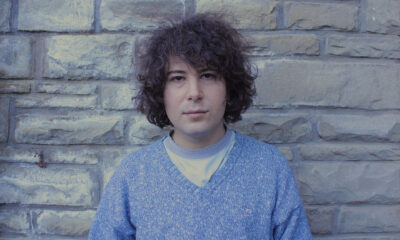Interviews
Interview with Dir En Grey guitarist Kaoru
Editors Note… Please note that the translations in the following may not be accurate as certain nuances and answers may not translate well into English as the members of Dir En Grey do not speak English and their answers required translation. Not since the German industrial metal outfit Rammstein released the smash single “Du Hast” from 2000’s Sehnsucht, has a hard rock/metal band bridged the language barrier and made a…

Editors Note… Please note that the translations in the following may not be accurate as certain nuances and answers may not translate well into English as the members of Dir En Grey do not speak English and their answers required translation. Not since the German industrial metal outfit Rammstein released the smash single “Du Hast” from 2000’s Sehnsucht, has a hard rock/metal band bridged the language barrier and made a splash on North American shores. Japanese ambient metal act Dir En Grey is aiming at become the next big rising star with the release of the group’s North American debut, Withering To Death. Already a big name on the Japanese hard rock scene since 1997, word of Dir En Grey’s intricate mixture of pop, metal, ambience, delicate melodies and lyrics sung in the band’s native tongue has since lit North American shores on fire. PureGrainAudio caught up with Dir En Grey prior to the band taking to the road opening for the Deftones. The band discussed their new album, the culture shock of North America and how they plan to bridge the language barrier through the power of music.
Can you explain the meaning behind the name Dir En Grey?
Kaoru: There is no particular meaning to it. It just sort of came to us.
What is the Japanese rock scene like and how does Dir En Grey do over there?
Kaoru: There are not many cool or outstanding bands in the Japanese rock scene. Most of them are commercial bands controlled by the music scene here. Good ones are few.
How did a Japanese band like Dir En Grey come to be signed by an American label like Warcon?
Kaoru: We had talks with Bob Chiappardi from Warcon and he understood our visions and our stance. That was why we decided to work with him. What we do as a band is the same no matter where we are, but to be able to work with someone who understands us regardless of the cultural difference between our countries is an honor.
Can you give us some insight into the title “Withering to Death”?
Kaoru: The album is all about the sense of hopelessness that is brought out by probing at the innermost feelings of hurt and suffering that exist in every human being, which happens to be the concept of this band. This album came about pretty naturally to us. As to what this album is all about, it’s best if you listen and feel it yourself.
Is there a message you want to get across through the lyrics with this release?
Kaoru: The lyrics to our songs are usually written by the lyricist for the lyricist himself so there are no particular messages. To each his own and for that again we urge for people to listen and feel.
Your musical style incorporates elements of metal, rock, and progressive into one mix. How would you describe your sound and what kid of bands influenced you such a dynamic mixture?
Kaoru: The fact that that we always aim to produce something different and something only we are capable of for every album and never have the same-sounding songs is probably why people tend to say that our musical style is a mixture of everything. Each member of this band listens to different types of music and that is perhaps why our sound is the way it is. We are influenced by Japanese rock but the stuff we like now are music from all over.
Your first live shows on American shows sold out in an instant without ever having an album released here, how blown away were you by the reaction?
Kaoru: We were really moved by the audience who were singing along to our songs in Japanese even though they didn’t know the language. We had no idea that they had been waiting for so long. We don’t know how they found out about us but we see it a result of us continuing with this band for almost 10 years.
What was it like seeing kids camped outside the Avalon to see you perform the next night?
Kaoru: Back in the day when we were like one of those kids, we would never have done the same even for our favorite artists who finally came to Japan, it was crazy. We just recently released our album in the states but that made us realize how the fans have been supporting us for many years before that. We were shocked and extremely happy.
Do you think that American audiences will be able to bridge the language barrier of your music?
Kaoru: Japanese is a difficult language as it is very complex because you are able to describe things to every single detail with it. Even Japanese people find our lyrics difficult to understand and not many do comprehend our lyrics 100%. To us our music is something you understand with your heart through our concerts and sound so the language barrier is not a big problem for us.
Because your music is in Japanese, do you look at a band like Rammstein as a model for success?
Kaoru: We haven’t really had a chance to find out more about Rammstein but we are making music not with success in our minds, that would be difficult. We are doing what we are to try to create music that would touch the listeners in some way or the other. We are really glad that the people who work with us overseas and in Japan are working hard to help us succeed with our concerts and our sound.
What was it like touring with Korn as a part of Family Values this summer?
Kaoru: First of all we would like to extend our gratitude to KORN and everyone else on board for inviting us on this amazing tour. Just like the name, we became like family on this tour, everyone was really friendly and welcoming, we experienced a lot of things on tour. It has just been a great plus to our band, no mistake.
What was your biggest culture shock when your first hit American shores?
Kaoru: I wouldn’t call this culture shock, maybe it is because we are Japanese that we think this way, but Americans are very cheerful and friendly people, we were always being approached by everyone around us for chat. There were times when we didn’t understand what was being said but, hey it was all fun. [ END ]
-

 Alternative/Rock22 hours ago
Alternative/Rock22 hours agoThe V13 Fix #010 w/ High on Fire, NOFX, My Dying Bride and more
-

 Hardcore/Punk1 week ago
Hardcore/Punk1 week agoHastings Beat Punks Kid Kapichi Vent Their Frustrations at Leeds Beckett University [Photos]
-

 Culture1 week ago
Culture1 week agoCirque Du Soleil OVO Takes Leeds Fans on a Unique, Unforgettable Journey [Photos]
-

 Alternative/Rock7 days ago
Alternative/Rock7 days agoA Rejuvenated Dream State are ‘Still Dreaming’ as They Bounce Into Manchester YES [Photos]
-

 Music2 days ago
Music2 days agoReclusive Producer Stumbleine Premieres Beat-Driven New Single “Cinderhaze”
-

 Culture3 days ago
Culture3 days agoDan Carter & George Miller Chat Foodinati Live, Heavy Metal Charities and Pre-Gig Meals
-

 Indie1 week ago
Indie1 week agoMichele Ducci Premieres Bouncy New Single “You Lay the Path by Walking on it”
-

 Alternative/Rock1 week ago
Alternative/Rock1 week agoWilliam Edward Thompson Premieres His Stripped-Down “Sleep Test” Music Video




